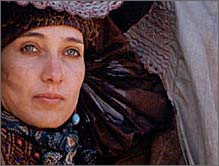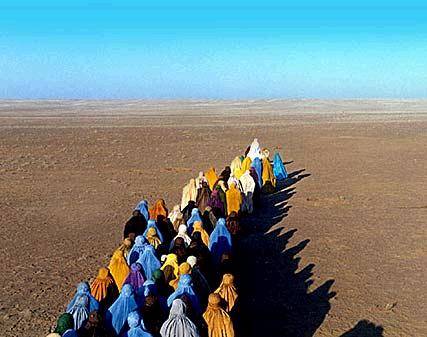Kandahar
(Safar e Ghandehar)


The World Trade Center attacks rippled across the entertainment world, delaying movies and changing the way screenwriters approach new scripts. Kandahar is probably the only movie increase its profile. The movie deals with a woman traveling into Afghanistan to save her sister. Her sister is suffering under the Taliban government (although the film never explicitly names them). The very fact that this movie deals with Afghanistan was enough for a title change, from the more anonymous The Sun Behind the Moon to Kandahar. In general, Iranian films have a low profile except for amongst movie critics and art house crowds. Another factor heightening Kandahar's profile is actor Hassan Tantai. Many allege that Tantai is another name for Hassan Abdul Rahman, another name for Daoud Salahuddin, who was formerly known as David Berfield. Berfield is an African-American Muslim who allegedly killed an Iranian political dissident then fled to Iran where he resides today. The United States has no extradition treaty with Iran, so there is no way to retrieve Tantai.
Most Iranian films do not employ real actors. Writer/director Mohsen Makhmalbaf (Tales of an Island, Kish Tales) usually tries to find people with similar experiences as the characters he is casting. For Tabib Sahid, he was looking for an American who moved to Iran, and he found Tantai. The story of Kandahar revolves around Nafas, played by Niloufaur Pazira. This is a fictional account of actual events in her life. Nafas fled Afghanistan with her parents when she was a child and grew up in Canada. She is returning because of a letter from her sister. Her sister will commit suicide during the next eclipse (hence the other title), and Nafas is returning to save her. Nafas has only a couple days before the eclipse, so she cannot undertake the same precautions one normally must. This involves donning a burka, the head-to-toe garment required of women, and a dangerous journey from Iran to Kandahar. Makhmalbaf is showing here that although Nafas is now covering herself, she is opening her eyes to a world completely unlike the one she lives in. Tantai and Pazira are not by any means great actors, but they do well enough to convey their messages. Tantai in particular has some memorable monologues dealing with freedom and love.
Nafas is recording a cassette for her sister, to explain what she is doing. It is extremely dangerous entering into Afghanistan, so she must pretend to be the wife of an Afghani. Later, she meets Sahid, who decides to help her as much as he can. As she gets closer to her goal, things become more dangerous. Makhmalbaf uses Kandahar to shed light on many problems faced by Afghanis. Foremost among them is the plight of women (Makhmalbaf wrote the recent The Day I Became A Woman). Nafas' sister is committing suicide because of the strictness and oppression she faces under the Taliban. Nafas also witnesses small girls and what they must give up by going back to Afghanistan. He uses Nafas' journey and the people she meets to show how everybody is affected by poverty and war. Landmine victims beg for artificial legs and must suffer through a yearlong waiting list, and a sense of extreme wariness exists for all strangers. Makhmalbaf uses strong, unforgettable imagery to cement these issues into the minds of viewers. Kandahar is a timely film, giving a fuller view of a people suddenly thrust into the spotlight.